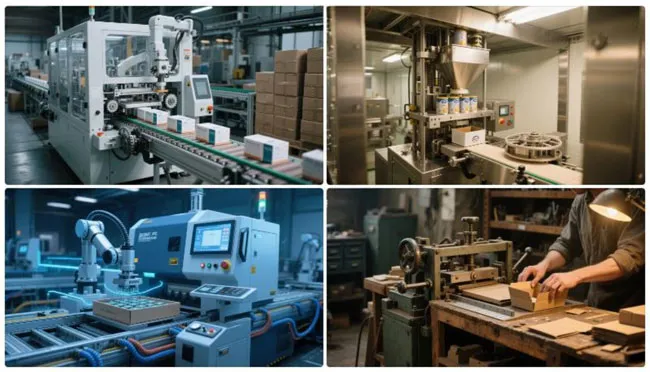A cartoning machine is an automated device designed to efficiently and accurately place products into cardboard boxes or cartons. It plays a crucial role in the packaging process across various industries, streamlining operations and ensuring products are ready for distribution.
There are several common types, each tailored to specific packaging needs:
• Horizontal Cartoning Machines: Ideal for packaging products like bottles, jars, and trays. They move products horizontally into the cartons, making them suitable for larger and bulkier items.
• Vertical Cartoning Machines: Best suited for smaller items such as sachets, blister packs, and small boxes. These machines operate with a vertical motion to form and fill the cartons, providing precision for delicate products.
• Servo-driven Cartoning Machines: Leverage advanced servo motors for precise control over carton forming, product loading, and sealing. This results in high speed and accuracy, perfect for high-volume production.
• Manual Cartoning Machines: As the name implies, they require more human intervention. These are typically used in low-volume production or for special packaging needs where flexibility is key.

The operation of a cartoning machine follows a systematic process:
1. Carton Formation: The machine retrieves flat carton blanks from a magazine. Using mechanical arms or suction cups, it then forms these blanks into open boxes.
2. Product Transportation: Products, whether individual items or grouped together, are conveyed to the carton loading station. This can be achieved through conveyors, robotic arms, or other feeding mechanisms.
3. Product Insertion: Once the products are accurately positioned, the machine inserts them into the open cartons.
4. Carton Sealing: Finally, the cartons are sealed. Depending on the carton design and packaging requirements, this may involve folding flaps, applying adhesive, using staples, or attaching labels.
Cartoning machines have extensive applications across multiple industries:
• Food and Beverage Industry: Used for packaging snacks, cereals, canned goods, and bottled beverages. They protect products during transportation and storage, maintaining freshness and quality.
• Pharmaceutical Industry: Vital for packaging tablets, capsules, liquid bottles, and medical devices. These machines adhere to strict hygiene and safety standards, ensuring product integrity.
• Cosmetics and Personal Care Industry: Employed to package creams, lotions, perfumes, and toiletries. They provide an attractive and secure packaging solution, enhancing product appeal.
• Electronics and Consumer Goods Industry: Used to package electronic components, gadgets, toys, and household items. They improve product presentation and facilitate efficient distribution.
By using cartoning machines, businesses can boost packaging efficiency, cut labor costs, maintain consistent packaging quality, and meet the market's demand for rapid and reliable product packaging.
GET A QUOTE